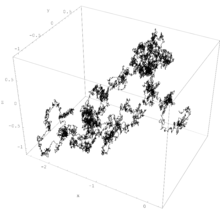
In probability theory and statistics, the term Markov property refers to the memoryless property of a stochastic process, which means that its future evolution is independent of its history. It is named after the Russian mathematician Andrey Markov.[1] The term strong Markov property is similar to the Markov property, except that the meaning of "present" is defined in terms of a random variable known as a stopping time.
The term Markov assumption is used to describe a model where the Markov property is assumed to hold, such as a hidden Markov model.
A Markov random field extends this property to two or more dimensions or to random variables defined for an interconnected network of items.[2] An example of a model for such a field is the Ising model.
A discrete-time stochastic process satisfying the Markov property is known as a Markov chain.
- ^ Markov, A. A. (1954). Theory of Algorithms. [Translated by Jacques J. Schorr-Kon and PST staff] Imprint Moscow, Academy of Sciences of the USSR, 1954 [Jerusalem, Israel Program for Scientific Translations, 1961; available from Office of Technical Services, United States Department of Commerce] Added t.p. in Russian Translation of Works of the Mathematical Institute, Academy of Sciences of the USSR, v. 42. Original title: Teoriya algorifmov. [QA248.M2943 Dartmouth College library. U.S. Dept. of Commerce, Office of Technical Services, number OTS 60-51085.]
- ^ Dodge, Yadolah. (2006) The Oxford Dictionary of Statistical Terms, Oxford University Press. ISBN 0-19-850994-4